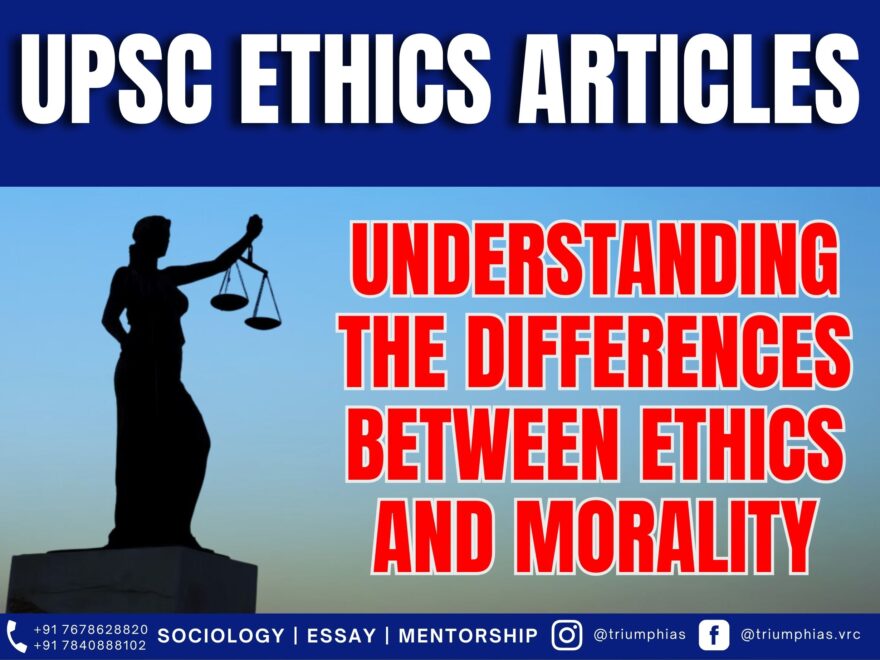The Differences Between Ethics and Morality
(Relevant for Ethics, Integrity and Aptitude)
Ethics vs Morality
While the terms ethics and morality are frequently utilized interchangeably, morality is more accurately employed to denote the traditions, principles of behavior, and moral guidelines of an individual, group, or community. On the other hand, ethics, also known as moral philosophy or the study of morals, constitutes a branch of philosophy that scrutinizes morality by critically analyzing the concepts of right and wrong within human actions.
The Major Differences Between Morals and Ethics are:
- Morality pertains to matters of ‘right or wrong,’ whereas ethics deals with concepts of ‘good or evil.’
- Morals are influenced by society, culture, or religion, while ethics are determined by the individual and shape their life.
- Morals are prescribed and shaped by the collective, leaving no room for personal contemplation or choice; individuals can either accept or reject them. Conversely, people have the liberty to contemplate and select the principles that govern their lives in ethics.
- Morals can vary from one society to another and from one culture to another. In contrast, Ethics remains consistent irrespective of any culture, religion, or society.
- If morality were merely a matter of common sense or intuition, then why do numerous ethical disputes and dilemmas persist in our society?
- One plausible explanation for these disagreements is that while everyone acknowledges some shared ethical norms, different individuals interpret, apply, and balance these norms in distinct ways, influenced by their personal values and life experiences.
Examples
To gain a deeper understanding of the interplay between ethics and morality within a society, let’s explore some instances.
- Corporate Ethics: Businesses and institutions adhere to a set of ethical standards and values that steer their conduct. For instance, numerous companies maintain a code of ethics outlining the anticipated behavioral standards for their employees. This code of ethics serves as a manifestation of the ethical values and principles deemed significant by the company.
- Personal Morality: Individuals possess their individual array of moral values and convictions that shape their actions. For instance, certain individuals hold the belief that falsehood is morally objectionable, while others may deem it acceptable under specific circumstances. Such discrepancies in moral values can have an impact on the ethical choices individuals make.
- Social Ethics: Entire societies uphold a collection of ethical principles and values that direct conduct. For instance, most societies institute laws against murder, theft, and other criminal acts. These laws mirror the ethical values and principles that the society views as paramount.
Ethics and morality represent two pivotal notions that significantly influence the formation of a society and its value system. Ethics furnishes a methodical framework for making moral choices and conducting oneself, whereas morality constitutes an individualized collection of convictions and principles that people rely upon to direct their actions. The interconnection between ethics and morality is intricate and evolving, as ethics contribute to the shaping of moral convictions, and in turn, moral beliefs contribute to the formulation of ethical principles and values. Instances illustrating the interaction of ethics and morality within a society encompass corporate ethics, personal moral codes, and societal ethics.
Sample Question for UPSC Sociology Optional Paper:
1. Question: What distinguishes ethics from morality in terms of societal influence?
Answer:
Morals are influenced by society, culture, or religion, whereas ethics are individual determinants that shape one’s life.
2. Question: How does personal morality differ from social ethics?
Answer:
Personal morality consists of individual beliefs and principles, while social ethics represent the collective ethical norms and values upheld by a society.
3. Question: Explain the role of a corporate code of ethics.
Answer:
A corporate code of ethics outlines the expected behavioral standards for employees, serving as a manifestation of the ethical values deemed significant by the company.
4. Question: Why do ethical disputes and dilemmas persist even when shared ethical norms exist?
Answer:
Different individuals interpret, apply, and balance these norms in distinct ways, influenced by their personal values and life experiences.
5. Question: How does the concept of ethics contribute to societal values and laws?
Answer:
Ethics furnishes a methodical framework for making moral choices, which in turn contributes to the formulation of societal norms and laws.
Related Blogs …
 |
 |
To master these intricacies and fare well in the Sociology Optional Syllabus, aspiring sociologists might benefit from guidance by the Best Sociology Optional Teacher and participation in the Best Sociology Optional Coaching. These avenues provide comprehensive assistance, ensuring a solid understanding of sociology’s diverse methodologies and techniques.
Ethics, Morality, Ethical Standards, Moral Values, Social Ethics, Corporate Ethics, Philosophy, Right and Wrong, Good and Evil, Culture, Religion, Personal Morality, “Ethics, Morality, Ethical Standards, Moral Values, Social Ethics, Corporate Ethics, Philosophy, Right and Wrong, Good and Evil, Culture, Religion, Personal Morality

Choose The Best Sociology Optional Teacher for IAS Preparation?
At the beginning of the journey for Civil Services Examination preparation, many students face a pivotal decision – selecting their optional subject. Questions such as “which optional subject is the best?” and “which optional subject is the most scoring?” frequently come to mind. Choosing the right optional subject, like choosing the best sociology optional teacher, is a subjective yet vital step that requires a thoughtful decision based on facts. A misstep in this crucial decision can indeed prove disastrous.
Ever since the exam pattern was revamped in 2013, the UPSC has eliminated the need for a second optional subject. Now, candidates have to choose only one optional subject for the UPSC Mains, which has two papers of 250 marks each. One of the compelling choices for many has been the sociology optional. However, it’s strongly advised to decide on your optional subject for mains well ahead of time to get sufficient time to complete the syllabus. After all, most students score similarly in General Studies Papers; it’s the score in the optional subject & essay that contributes significantly to the final selection.
“A sound strategy does not rely solely on the popular
Opinion of toppers or famous YouTubers cum teachers.”
It requires understanding one’s ability, interest, and the relevance of the subject, not just for the exam but also for life in general. Hence, when selecting the best sociology teacher, one must consider the usefulness of sociology optional coaching in General Studies, Essay, and Personality Test.
The choice of the optional subject should be based on objective criteria, such as the nature, scope, and size of the syllabus, uniformity and stability in the question pattern, relevance of the syllabic content in daily life in society, and the availability of study material and guidance. For example, choosing the best sociology optional coaching can ensure access to top-quality study materials and experienced teachers. Always remember, the approach of the UPSC optional subject differs from your academic studies of subjects. Therefore, before settling for sociology optional, you need to analyze the syllabus, previous years’ pattern, subject requirements (be it ideal, visionary, numerical, conceptual theoretical), and your comfort level with the subject.
This decision marks a critical point in your UPSC – CSE journey, potentially determining your success in a career in IAS/Civil Services. Therefore, it’s crucial to choose wisely, whether it’s the optional subject or the best sociology optional teacher. Always base your decision on accurate facts, and never let your emotional biases guide your choices. After all, the search for the best sociology optional coaching is about finding the perfect fit for your unique academic needs and aspirations.
To master these intricacies and fare well in the Sociology Optional Syllabus, aspiring sociologists might benefit from guidance by the Best Sociology Optional Teacher and participation in the Best Sociology Optional Coaching. These avenues provide comprehensive assistance, ensuring a solid understanding of sociology’s diverse methodologies and techniques. Sociology, Social theory, Best Sociology Optional Teacher, Best Sociology Optional Coaching, Sociology Optional Syllabus.
Best Sociology Optional Teacher, Sociology Syllabus, Sociology Optional, Sociology Optional Coaching, Best Sociology Optional Coaching, Best Sociology Teacher, Sociology Course, Sociology Teacher, Sociology Foundation, Sociology Foundation Course, Sociology Optional UPSC, Sociology for IAS,
Follow us :


https://t.me/VikashRanjanSociology
Find More Blogs
|
Scope of the subject and comparison with other social sciences |
|||
|
|
|
|
Modernity and social changes in Europe |



6 comments